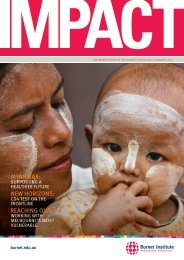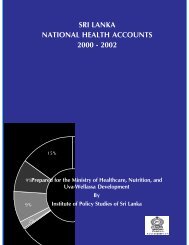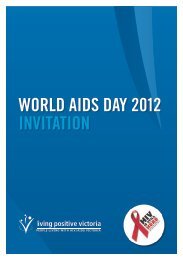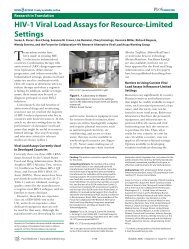Illicit Drug use in the Asia Pacific Region - Burnet Institute
Illicit Drug use in the Asia Pacific Region - Burnet Institute
Illicit Drug use in the Asia Pacific Region - Burnet Institute
Create successful ePaper yourself
Turn your PDF publications into a flip-book with our unique Google optimized e-Paper software.
Situational analysis of illicit drug issues and responses <strong>in</strong> <strong>the</strong> <strong>Asia</strong>–<strong>Pacific</strong> region<br />
240<br />
A10 .5 Summary table<br />
Estimated number of current drug <strong>use</strong>rs In 1999, an estimated 1 .8 million people<br />
were regular illicit drug <strong>use</strong>rs<br />
Ma<strong>in</strong> drugs <strong>use</strong>d Shabu (methamphetam<strong>in</strong>es) and cannabis<br />
<strong>Drug</strong>s <strong>in</strong>jected Inject<strong>in</strong>g drug <strong>use</strong> <strong>in</strong> <strong>the</strong> Philipp<strong>in</strong>es<br />
is reported to be limited<br />
Estimated prevalence of<br />
HIV <strong>in</strong>fection among IDUs<br />
A10 .6 Country responses to drugs<br />
Agreements and treaties<br />
The Philipp<strong>in</strong>es is party to <strong>the</strong> 1988 UN <strong>Drug</strong><br />
Convention, <strong>the</strong> 1961 UN S<strong>in</strong>gle Convention, as<br />
amended by <strong>the</strong> 1972 Protocol, and <strong>the</strong> 1971<br />
UN Convention on Psychotropic Substances .<br />
The Philipp<strong>in</strong>es also ratified <strong>the</strong> UN Convention<br />
aga<strong>in</strong>st Transnational Organised Crime,<br />
<strong>the</strong> Protocol to Suppress and Punish Traffick<strong>in</strong>g<br />
<strong>in</strong> Persons, and <strong>the</strong> Protocol aga<strong>in</strong>st <strong>the</strong><br />
Smuggl<strong>in</strong>g of Migrants .<br />
Policy responses<br />
The Dangerous <strong>Drug</strong>s Board has an expanded<br />
membership and shifted mandate to <strong>the</strong><br />
previous <strong>Drug</strong> Board, operat<strong>in</strong>g under<br />
previous legislation . Its role is a policymak<strong>in</strong>g<br />
and strategy-formulat<strong>in</strong>g body for<br />
<strong>the</strong> entire country .<br />
Based on <strong>the</strong> National HIV Sent<strong>in</strong>el<br />
Surveillance System of <strong>the</strong> National<br />
Epidemiology Centre (DoH), no drugrelated<br />
HIV case was recorded <strong>in</strong> 2003 .<br />
The roles of <strong>the</strong> DDB are as follows:<br />
• policy-mak<strong>in</strong>g and strategy-formulat<strong>in</strong>g<br />
body for an <strong>in</strong>tegrated system of plann<strong>in</strong>g,<br />
implementation and enforcement of antidrug<br />
policies, programs and projects<br />
• policy studies, program monitor<strong>in</strong>g and<br />
evaluation, and o<strong>the</strong>r research on drug<br />
prevention, control and enforcement<br />
• orchestrates, coord<strong>in</strong>ates and oversees <strong>the</strong><br />
implementation of <strong>the</strong> National Anti <strong>Drug</strong><br />
Program of Action by national government<br />
agencies, local government units,<br />
government-owned and controlled corporations<br />
and participat<strong>in</strong>g non-government<br />
organisations .<br />
On 7 June 2002 <strong>the</strong> President signed comprehensive<br />
counter-narcotics law . The new<br />
legislation, Comprehensive Dangerous <strong>Drug</strong>s<br />
Act of 2002, replaced <strong>the</strong> Dangerous <strong>Drug</strong>s<br />
Act of 1972 and took effect on 4 July 2002 .<br />
Before <strong>the</strong> new law, drug law enforcement<br />
efforts were decentralised with separate<br />
law narcotics units <strong>in</strong> each law enforcement<br />
agency compet<strong>in</strong>g for fund<strong>in</strong>g and<br />
jurisdiction . The new law established <strong>the</strong><br />
Philipp<strong>in</strong>e <strong>Drug</strong> Enforcement Agency (PDEA)<br />
modelled after <strong>the</strong> United States <strong>Drug</strong><br />
Enforcement Agency . Under its mandate<br />
<strong>the</strong> PDEA absorbs exist<strong>in</strong>g counter-narcotics<br />
units and responsibilities . The Philipp<strong>in</strong>es<br />
‘National Anti-<strong>Drug</strong> Strategy’ aims to atta<strong>in</strong><br />
a drug-free Philipp<strong>in</strong>es by 2010, us<strong>in</strong>g <strong>the</strong><br />
follow<strong>in</strong>g national objectives:<br />
• To reduce to zero, or at least m<strong>in</strong>imise,<br />
<strong>the</strong> profits derived from illicit drug<br />
activities through Supply Reduction<br />
and Demand Reduction, <strong>in</strong> order to<br />
fulfil <strong>the</strong> Freedom from Fear for our<br />
people;<br />
• To address and eradicate, or at least<br />
alleviate, <strong>the</strong> deficiencies and risk factors<br />
<strong>in</strong> <strong>the</strong> country that abet <strong>the</strong> drug<br />
menace, <strong>in</strong> order to fulfil <strong>the</strong> Freedom<br />
from Want for its people and <strong>the</strong>reby<br />
pre-empt <strong>the</strong>m from committ<strong>in</strong>g or<br />
becom<strong>in</strong>g victims of drug related<br />
crimes; and<br />
• To motivationally enlighten, empower<br />
and mobilise <strong>the</strong> people to participate<br />
<strong>in</strong> and support <strong>the</strong> Crim<strong>in</strong>al Justice<br />
System and <strong>the</strong> Government Mach<strong>in</strong>ery<br />
<strong>in</strong> atta<strong>in</strong><strong>in</strong>g <strong>the</strong> two aforementioned<br />
objectives, so that Participatory Democracy<br />
shall be <strong>in</strong>stitutionalised <strong>in</strong> <strong>the</strong>ir<br />
society .<br />
Strategic Concepts<br />
A three pronged approach has been forwarded,<br />
with each prong assigned to<br />
accomplish its objective .<br />
1st Prong: Supply and Demand<br />
Reduction Campaign<br />
It consists of prevention and control<br />
measures aga<strong>in</strong>st <strong>the</strong> production, process<strong>in</strong>g,<br />
traffick<strong>in</strong>g, f<strong>in</strong>anc<strong>in</strong>g, retail<strong>in</strong>g and<br />
consumption of dangerous drugs, controlled<br />
precursors and essential chemicals<br />
and plant sources of dangerous drugs; so<br />
as to make illicit drug trade unprofitable<br />
and <strong>the</strong>reby accomplish <strong>the</strong> first national<br />
objective .<br />
2nd Prong: Development/Reform Package<br />
It <strong>in</strong>cludes Alternative Development/Livelihood,<br />
Family solidarity, Education, Enhancement<br />
of <strong>the</strong> Crim<strong>in</strong>al Justice System, Legal<br />
Reform, etc to address/mitigate <strong>the</strong> risk<br />
factors/deficiencies that breed/abet <strong>the</strong><br />
drug problem <strong>in</strong> <strong>the</strong> country and <strong>the</strong>reby<br />
atta<strong>in</strong> <strong>the</strong> second national objective .<br />
3rd Prong: People Empowerment<br />
Campaign<br />
It <strong>in</strong>volves <strong>the</strong> conduct of motivational<br />
enlightenment, organisation and mobilisation<br />
of as many people as possible to<br />
participate <strong>in</strong> and support <strong>the</strong> 1st and<br />
2nd Prongs as force/resource multipliers,<br />
and <strong>the</strong>reby accomplish <strong>the</strong> third national<br />
objective . The ultimate goal is to realise<br />
and harness people power aga<strong>in</strong>st <strong>the</strong><br />
drug menace nationwide .<br />
241<br />
Country profiles: Philipp<strong>in</strong>es









